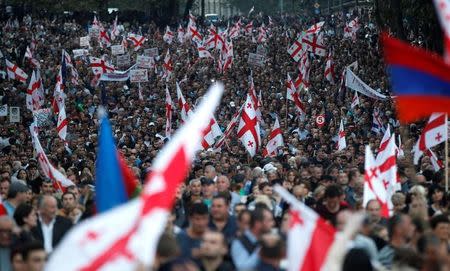Election in ex-Soviet Georgia seen as test of stability after violence

By Margarita Antidze TBILISI (Reuters) - A close parliamentary election in Georgia on Saturday is being seen as a test of stability in the ex-Soviet state after a car bombing and a shooting marred the run-up to the vote. Criss-crossed by strategically important oil and gas pipelines and traditionally buffeted between Russia and the West, a fifth of Georgian territory remains under the control of pro-Russian separatists and the economy is emerging from a deep slowdown, which has crimped living standards. Opinion polls suggest the ruling Georgian Dream party, which is funded and controlled by the country's richest man, is likely to win. But they also show strong support for the opposition United National Movement (UNM) and suggest many voters are undecided. "No one can be sure who the winner will be, but the vote is expected to be free and fair," said Thomas de Waal, a Caucasus expert at the Carnegie Endowment for International Peace. The pre-election atmosphere in the nation of 3.7 million, a U.S. ally, is tense after an opposition deputy's car was blown up in Tbilisi, the capital, on Tuesday. Givi Targamadze survived unscathed, but five passers-by were injured. In a separate attack, two men were shot and wounded on Sunday at a speech by Irakly Okruashvili, an independent candidate and former defence minister, in the town of Gori. Georgia fought and lost a short war with Russia in 2008 and both the government and the opposition would like to see it join the European Union and NATO one day. Georgian Dream also favours stronger ties with Russia. Originally a coalition of six parties, Georgian Dream was founded by billionaire Bidzina Ivanishvili, who made his fortune in Russia. It came to power in 2012, ending the nine-year rule of former President Mikheil Saakashvili's UNM. It was the first peaceful transfer of power since the 1991 Soviet collapse and followed public protests over a scandal involving the mistreatment of prison inmates and accusations that Saakashvili, who was feted in the West for his reforms, was behaving in an authoritarian manner. Under Georgian Dream, dozens of ex-officials, including a former prime minister, have been arrested on charges such as abuse of power, and some Western countries have accused the government of selectively applying justice. Saakashvili, now a regional politician in Ukraine, is wanted at home on charges of exceeding his authority, embezzlement, corruption and brutality. He says the charges are politically-motivated. Some Georgians accuse the government of mishandling the economy. "They (the government) did not do what they promised four years ago," Tina Kutivadze, a 69-year-old pensioner from Tbilisi, said. "Where are the cheap loans and higher pensions?" The economy expanded at a rate of 2.7 percent in the first eight months of this year. (Editing by Andrew Osborn and Raissa Kasolowsky)

